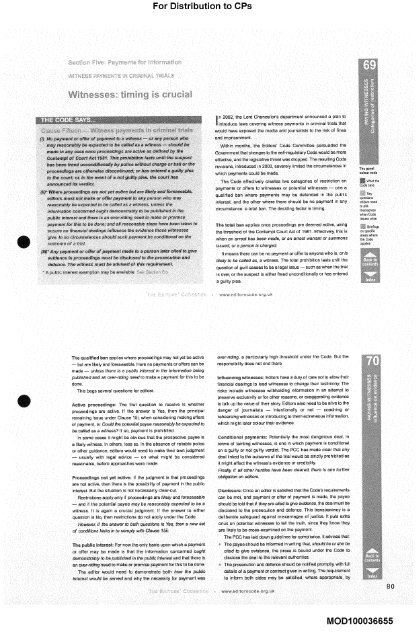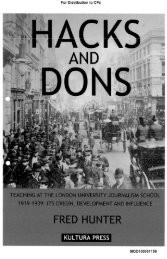The Edi ' - The Leveson Inquiry
The Edi ' - The Leveson Inquiry
The Edi ' - The Leveson Inquiry
Create successful ePaper yourself
Turn your PDF publications into a flip-book with our unique Google optimized e-Paper software.
~v~.~. r . ~ ix ~ x.~ ~L~ ~C;¢ ~:"~’~~L;~<br />
Wirelesses: t~m~n~ ~s c~{~c~at<br />
For Distribution to CPs<br />
<strong>The</strong> qualified ban applies where proceedings may not yet be active<br />
out are likely and foreseeable. Here no payments or offers can be<br />
made -- unless there is a public interest m the information being<br />
published cad an over-riding need to make a payment for this to be<br />
done.<br />
This begs several questions for editors.<br />
Active proceedings: <strong>The</strong> first question to resolve IS whether<br />
3receedings are active. If the answer is Yes, then the principal<br />
remaining issue under Clause 15i, when considering making offers<br />
of payment, ~s: Could the potential payee reasonably be expected to<br />
be called as a witness? If so, payment Is prohibited.<br />
In some cases it might be obvious that the prospective payee ~s<br />
a likely witness./n others, less so n the absence of reliable police<br />
or other guidance editors would need to make their own judgment<br />
-- usually with legal advice -- on what might be considered<br />
reasonable, before approaches were made.<br />
Proeeedin8~ not yet active: If the judgment Is that proceedings<br />
are not active, then there is the possibility of payment in the public<br />
interest. But the situation is not necessarily clear-cut.<br />
Restrictions apply only if proceedings are likely and foreseeable<br />
-- end if the 3ofentiol payee may be reasonably expected to be a<br />
witness. It is agora a crucial judgment, if the answer to either<br />
question is No, then restrictions do not apply under the Code.<br />
However, if the answer to both questions is Yes, then a new set<br />
of conditions kicks in to comply with Clause 15fi:<br />
~ n 2002, the Lord Chancellor’s department announced o plan to<br />
introduce taws covering witness payments in criminal trials that<br />
would hove exposed the media and journalists to the risk of fines<br />
and imprisonment.<br />
Within months, the <strong>Edi</strong>tors’ Code Committee persuaded the<br />
Government that changes to the self-regulatory Code would be more<br />
effective, and the tegislotivethreat was dropped <strong>The</strong> resulting Code<br />
revisions, introduced in 2003, severely limited the circumstances in<br />
which payments could be made<br />
<strong>The</strong> panel<br />
colour code<br />
<strong>The</strong> Code effectively creates two categories of restriction on<br />
payments or offers to witnesses or potential wlthesses -- one a<br />
~ Whatthe<br />
Code says<br />
qualified ban where poyrnents may be defended in the public<br />
interest, and the other where there should be no payment in any<br />
circumstance: e total ban. <strong>The</strong> deciding factor ~s timing<br />
~,;,~ ~,ey<br />
auest~ns<br />
e~ltors neer~<br />
[o ask<br />
themselves<br />
when Code<br />
~ssues arise<br />
<strong>The</strong> total ban applies once proceedings are deemed active, using<br />
the threshold of the Contempt Court Act of 1981. Effectively this is<br />
when on arrest has been made, or an arrest warrant or summons<br />
issued, or a person is charged,<br />
~5~ Briefings<br />
~n specific<br />
areas where<br />
the Code<br />
applies<br />
it means there can be no payment or offer to anyone who is, oris<br />
likely to be coiled as a witness. <strong>The</strong> total prohibition lasts until the<br />
question of guilt ceases to be a legal issue -- such as when the trial<br />
is over, orthe suspect is either freed unconditional y or has entered<br />
a guilty plea.<br />
over-riding, a particu!arly h~gh threshold under the Code. But the<br />
responsibility does not end there.<br />
Inf~oeaein~ witnesses: <strong>Edi</strong>tors hove a duty of care not to allow their<br />
financial dealings to lead witnesses to change their testimony. <strong>The</strong><br />
risks include witnesses withholding information m an attan ~ 3t to<br />
preserve exclusivity or for other reasons, or exaggerating evidence<br />
to talk up the value of their story <strong>Edi</strong>tors also need to be alive to the<br />
danger of journalists -- intantionally or not coaching or<br />
rehearsing witnesses or introducing to them extraneous information<br />
which might later colour thei~ evidence.<br />
Conditional payments: Potentially the most dangerous deal, m<br />
terms of tainting witnesses, ~s one in which payment is conditional<br />
on o guilty or not guilty verdict. <strong>The</strong> PCC has made clear that any<br />
deal linked to the outcome of the trial would be stricty prohibited as<br />
it might affect the withess’s evidence or credibility.<br />
Finally, if all other hurdles have been cleared, there is one further<br />
obligation on editors.<br />
Dieclesore: Once an editor Is satisfied that the Code’s requirements<br />
can be met, and payment or offer of payment is made, the payee<br />
should be told that if they are cited to give evidence, the deal must be<br />
disclosed to the prosecubon and defence. This transparency ~s a<br />
deliberate safeguard against miscarriages of justice. It puts extra<br />
onus on potential witnesses to tell the truth, since they know they<br />
are likely to be cross-examined on the payment.<br />
<strong>The</strong> PCC has laid down guidelines for comuliance. It advises that:<br />
<strong>The</strong> payee should be informed in writing that, should he orshe be<br />
cited to give evidence, the press is bound under the Code to<br />
<strong>The</strong> pebli¢ interest: For now the only basis upon which a payment<br />
or offer may be made is that the information concerned ought<br />
demonstrably to be pubfshed in the public interest and that there is disclose the deal to the relevant authorities.<br />
anover-ridingneedtomokeorpremisepaymentferthistobedone. ~ <strong>The</strong> prosecution and defence should be notified promptly, with full<br />
<strong>The</strong> editor would need to demonstrate both how ~he public details of o payment or contract given in writing. <strong>The</strong> requirement<br />
interest would be served and why the necessity for payment was to inform both sides may be satisfied, where appropriate, by<br />
8O<br />
MOD100036655
















